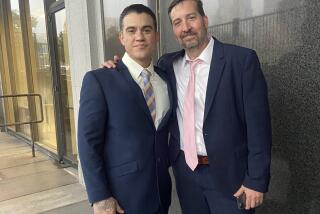Cocaine smuggler serving 140 years freed early, part of national trend

Atty. Gen. Loretta Lynch once opposed releasing Francois Holloway, a convicted car-jacker, from prison. She later withdraw that opposition, part of a trend of freeing nonviolent prisoners with unblemished records.
- Share via
Reporting from Washington — Luis Anthony Rivera was sentenced to life behind bars plus 140 years for his role in a 1983 cocaine-smuggling scheme, but just after midnight on Wednesday morning, he walked out of a Florida penitentiary a free man.
Francois Holloway was similarly sent home last summer, well short of the 57-year sentence he received in 1996 for multiple car-jackings, a punishment that could have kept him locked up until age 89.
The little-noticed releases of Rivera and Holloway are pointing the way toward an unconventional method for gaining early release for nonviolent prisoners with unblemished records.
The White House and many members of Congress have been trying for several years to address what officials in both parties see as unduly harsh sentences, particularly of black and Latino men. But at the Department of Justice, requests for clemency, commutations and pardons just keep piling up.
Last year, President Obama announced a new effort to free some nonviolent offenders serving disproportionate sentences, and more than 35,000 prisoners applied. But so far only 46 have been released. Lengthy reviews of applications are choking the system, officials say.
The federal prison system, meanwhile, is near to bursting. The cost to taxpayers to house a federal inmate has doubled in the last 30 years, to $31,000 a year, with many convicts aging and in need of specialized care.
“The long prison terms for drug traffickers, violent felons and habitual criminals means that the number of elderly, infirm and dying prisoners will increase,” said Paul J. Larkin Jr., senior legal research fellow at the Heritage Foundation. “And with it, the cost of their care.”
On the other side, Jon Adler, national president of the Federal Law Enforcement Officers Assn., warned his membership in August that the “release of these federal prisoners does not benefit the American public.”
Rivera and Holloway asked federal judges for leniency, something that happens frequently, and federal prosecutors agreed not to fight, which is rare.
The original sentencing judges agreed to take a fresh look at the punishments of the two men. Assured that both had turned their lives around, the judges and prosecutors agreed to vacate parts of their original convictions and reduce their sentences to “time already served.”
Legal experts predict the cases could open the door to similar requests by many more prisoners if federal prosecutors are willing to take the same approach elsewhere.
“That’s a pretty novel way to do things,” said Marc Mauer, executive director of the Sentencing Project, a Washington-based advocacy group. “I’ve not run across a lot of people who ever get out that way, and we get letters every day from people wanting help.”
Mauer predicted that the Rivera and Holloway examples will prompt defense lawyers around the country to seek similar relief for clients and will give judges “a level of comfort” in agreeing.
“It’s always the courageous ones that go first,” he said.
Holloway’s case went to court last year in Brooklyn, where the top federal prosecutor at the time was U.S. Atty. Loretta Lynch, who is now attorney general. Lynch at first resisted his release, suggesting he seek a presidential commutation. But she ultimately agreed not to oppose his appeal.
The original sentencing judge, John Gleeson, a former prosecutor who had put Mafia boss John Gotti in prison, noted that Holloway had served more time for robbing three cars than “if he had committed first-degree murder.”
“Black men like Holloway have long been disproportionally subjected to the stacking of counts,” Gleeson said, referring to sentencing rules that he said forced him to sentence Holloway to 57 years in prison in 1996.
The judge applauded Lynch for consenting to the release.
“This is a significant case, and not just for Francois Holloway,” he said. “It demonstrates the difference between a Department of Prosecutions and a Department of Justice.”
In the Rivera case, federal prosecutors in Muskogee, Okla., working under Atty. Gen. Lynch, agreed this summer not to block his release. That came after Rivera’s attorneys convinced federal Judge Frank H. Seay that spending tens of thousands of dollars a year to hold him was a waste of taxpayer money.
When he had sentenced Rivera in 1985 for his role in smuggling 464 pounds of cocaine into the U.S., Seay had spoken at length against the scourge of drugs and said Rivera had lied at his trial and shown no remorse.
“Rehabilitation appears hopeless for a person of your experience and knowledge,” he said. “My intent is that you spend the rest of your life in federal institutions.”
But the lawyers who took on Rivera’s case -- Sam S. Sheldon, a partner with the Los Angeles-based Quinn Emanuel law firm, and Richard E. Davis, a Birmingham, Ala., attorney -- argued in court papers that “there is nothing left to be gained by Rivera spending the rest of his life in prison.”
They repeatedly cited Lynch and the “Holloway doctrine” and stressed that, like Holloway, Rivera was a model prisoner.
Federal prosecutors in Oklahoma agreed on Tuesday not to oppose his release, citing the Holloway case as a precedent.
Rivera “has not had a single disciplinary action,” said Mark F. Green, the U.S. attorney in Muskogee. “Thirty years of incarceration is sufficient punishment.”
Judge Seay then signed the release order.
Now 59, Rivera emailed his lawyers shortly before walking out the prison door. “I am going to the law library right now to print a hard copy so I can hold it in my hand,” he said of the judge’s order. “I am going to have it framed.”
Twitter: @RickSerranoLAT
ALSO:
California killer faces Virginia execution
No punishment for Beverly Hills exotic car speeders who claimed immunity
No bomb charges against Muslim boy who brought homemade clock to school
More to Read
Sign up for Essential California
The most important California stories and recommendations in your inbox every morning.
You may occasionally receive promotional content from the Los Angeles Times.











